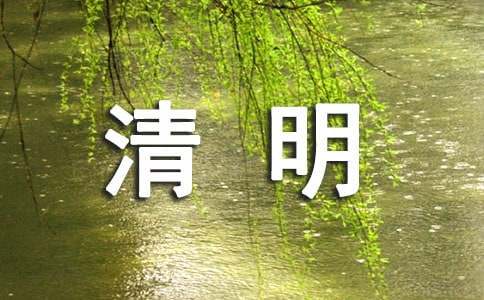- 相关推荐
清明节英语作文中学生优秀作文精选
导语:中学生有关清明节的英文作文要怎么写?清明节用英语怎么说?以下是品才网pincai.com小编整理的清明节英语作文中学生优秀作文精选,欢迎阅读参考!

清明节英语作文中学生
Qing Ming Jie(All Souls' Day)
Qing Ming is a time to remember the dead and the dearly departed. More imnt, it is a period to honour and to pay respect to one's deceased ancestors anily members. Because it reinforces the ethic of filial piety, Qing Ming is a majornese festival.
Literally meaning "clear" (Qing) and "bright" (Ming), this Chinese festival falls rly spring, on the 106th day after the winter solstice. It is a "spring" festival, ans an occasion for the whole family to leave the home and to sweep the gravesheir forebears. Chinese being practical people this sweeping of the graves is gin extended period, that is, 10 days before and after Qing Ming day. Among soalect groups a whole month is allocated.
清明节是一个纪念祖先的节日。主要的纪念仪式是扫墓,扫墓是慎终追远、郭亲睦行孝的具体表现;基于上述意义,清明节因此成为华人的重要节日。 清明节是在仲春和之交,也就是冬至后的`106天。扫墓活动通常是在清明节的前十天或后十天。有些地域士的扫墓活动长达一个月。
清明节英语作文中学生
Qing Ming is popularly associated with Jie Zi Zhui, who lived in Shanxi province in 600 B.C. Legend has it that Jie saved his starving lord's life by serving a piece of his own leg. When the lord succeeded in becoming the ruler of a small principality, he invited his faithful follower to join him. However, Jie declined his invitation, preferring to lead a hermit's life with his mother in the mountains.
Believing that he could force Jie out by burning the mountain, the lord ordered his men to set the forest on fire. To his consternation, Jie chose to remain where he was and was burnt to death. To commemorate Jie, the lord ordered all fires in every home to be put out on the anniversary of Jie's death. Thus began the "cold food feast", a day when no food could be cooked since no fire could be lit. = www.babaimi.com
The "cold food" festival occurs on the eve of Qing Ming and is often considered as part of the Qing Ming festival. As time passes, the Qing Ming festival replaced the "cold food" festival. Whatever practice is observed,the basic observation of Qing Ming is to remember one's elders by making a special effort to visit their graves, ashes or ancestral tablets. To make the visit even more meaningful, some time should be spent to remind the younger members of the family of the lives and contributions of their ancestors, and the story of Jie Zi Zhui who choose death over capitulation.
清明节英语作文中学生
清明时节雨纷纷, 路上行人欲断魂。 借问酒家何处有, 牧童遥指杏花村 .(杜 牧) Qing Ming Festival; Toom-sweeping Day.
清明节是我国民间重要的传统节日,是重要的“八节”(上元(元宵节)、清明、立夏、端午、中元、中秋、冬至和除夕)之一。一般是在公历的四月五日,但其节期很长,有十日前八日后及十日前十日后两种说法,这近二十天内均属清明节。 清明节的起源,据传始于古代帝王将相“墓祭”之礼,后来民间亦相仿效,于此日祭祖扫墓,历代沿袭而成为中华民族一种固定的风俗。
我国传统的清明节大约始于周代,已有二千五百多年的历史。清明最开始是一个很重要的节气,清明一到,气温升高,正是春耕春种的大好时节,故有“清明前后,种瓜种豆”。“植树造林,莫过清明”的农谚。后来,由于清
明与寒食的日子接近,而寒食是民间禁火扫墓的日子,渐渐的,寒食与清明就合二为一了,而寒食既成为清明的别称,也变成为清明时节的一个习俗,清明之日不动烟火,只吃凉的食品。
是我国汉族的传统节日之一,为中国二十四节气之一,时间约在每年的阳历4月5日前后。清明节后雨水增多,大地呈现春和景明之象。这一时节万物“吐故纳新”,无论是大自然中的植被,还是与自然共处的`人体,都在此时换去冬天的污浊,迎来春天的气息,实现由阴到阳的转化。
古有清明前一天为“寒食节”之说,相传起于春秋时期晋文公悼念介子推“割股充饥”一事,后逐渐清明寒食合二为一。唐代扫墓日期一般在
寒食节,宋后移到清明。传说中“寒食节”的起源地就在山西中部介休,介休一名的来历即是为纪念介子推“割股充饥”而不图为报,最终在此被大火烧山而亡,绵山所在地原叫“定阳”,被晋文公更名为“介休”,意为介子推休息之地。现绵山已由当地人民开发为著名旅游景区,其中一重要景点就是高大的介子推母子石像,介子推成为当地人民效忠两全的人物的代表。
相传大禹治水后,人们就用“清明”之语庆贺水患已除,天下太平。此时春暖花开,万物复苏,天清地明,正是春游踏青的好时节。踏青早在唐代就已开始,历代承袭成为习惯。踏青除了欣赏大自然的湖光山色、春光美景之外,还开展各种文娱活动,增添生活情趣。
清明节流行扫墓,其实扫墓乃清明节前一天寒食节的内容,寒食相传起于晋文公悼念介子推一事。唐玄宗开元二十年诏令天下,“寒食上墓”。因寒食与清明相接,后来就逐渐传成清明扫墓了。明清时期,清明扫墓更为盛行。古时扫墓,孩子们还常要放风筝。有的风筝上安有竹笛,经风一吹能发出响声,犹如筝的声音,据说风筝的名字也就是这么来的。
清明节还有许多失传的风俗,如古代曾长期流传的戴柳、射柳、打秋千等,据载,辽代风俗最重清明节,上至朝廷下至庶民百姓都以打秋千为乐,仕女云集,踏青之风也极盛。which means clear and bright in Chinese, falls on April 5th this year. It is both the fifth term in the traditional lunar calendar and a festival to hold memorial ceremony for the dead. It is a time to express one's grief for his lost relatives. An ancient elegiac poem, which described a grievous woman, was read that vines tangled in vain and weeds crept in the graveyard, and her husband slept there lonely. It was so difficult to endure for her as if summer in the day and winter at night. And her only wish was to reunite with him after death.
People often go to sweep and weed graves with whole family and take a walk in the countryside as well. In Tang Dynasty, the habit of taking an excursion on this day was developed. At this time, spring returns and dominates the earth again. The feel of growing life is in the air, with sap ascending in trees and buds bursting. And the willow branches ed on each gate add vigor and vitality to the surroundings. But it actually means more than that. This custom can be traced back to over one thousand years ago.
During the Period of Spring and Autumn in the Jin Kingdom, one of the King's sons was called Chong Er. Jealous of his talent, a concubine falsely accused him of rebellion to make her son the crown prince. He had no choice but to flee and with him were some officials. They hid themselves in a mountain and went hungry for quite some time. An official named Jie Zitui took great pain to cut some flesh from his thigh and cooked it for Chong Er. When the fact was known the young master was moved to tears and knelt down in gratitude. And Jie replied his best repayment should be a just king. They lived a life of hunger and cold for three years until the evil concubine died. Many soldiers were sent to look for him and to escort him back home. Going into the carriage, he saw an official packed an old mat onto a horse, he said laughingly, 'What on earth is the use of that? Throw it away!' Jie Zitui heard it and sighed, 'It is hardship that can be shared with his majesty but not prosperity.' So he went away quietly and lived in seclusion with his old mother.
As Chong Er became king, he rewarded many people but he forgot Jie Zitui. He did not realize it until was reminded. However his invitation was refused and he flared up. Soldiers were ordered to burn up the mountain to force Jie to come out. Finally they found Jie and his mother scorched under a willow. He would rather die than yield to the power. Chong Er was so overwhelmed with regret that he ordered people hold memorial ceremony for Jie. So every year on that day folks mourned for him and the day before ate cold meals, which avoided making fire. Later the custom of ing willow branches on gates was also added
资深写手 • 1对1服务
品质保证、原创高效、量身定制满足您的需求
【清明节英语作文中学生优秀作文】相关文章:
清明节优秀英语作文04-19
关于清明节的英语优秀作文06-25
中学生英语作文06-23
清明节英语作文06-22
清明节的英语作文07-04
清明节英语作文06-20
中学生清明节作文06-23
清明节中学生作文04-19
中学生英语作文范文07-04
中学生英语作文分享06-24






